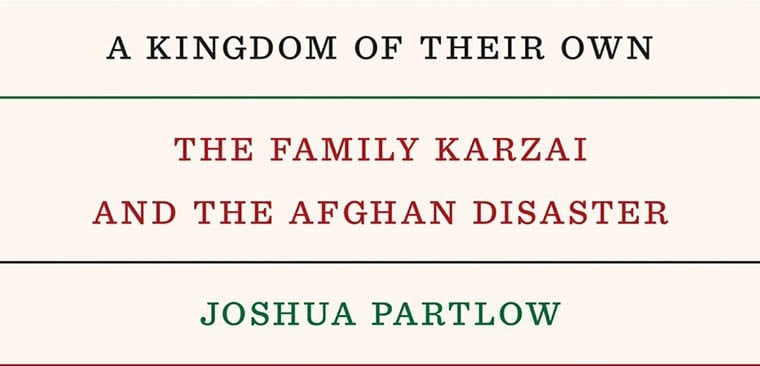
In this book, Washington Post’s former bureau chief in Kabul aims to understand the Afghan war and why the Americans could not win it

In his A Kingdom of Their Own: The Family Karzai and the Afghan Disaster, Joshua Partlow, Washington Post’s former bureau chief in Kabul, sets out to understand: "Why couldn’t the world’s most powerful army defeat a bunch of farmers in plastic sandals on dirt bikes?"
The answer to his research question, he argues, lies in understanding the Karzai family’s "personal rivalries and political lives". Why? Because "It was not so much the combat that defined … the war in Afghanistan, but these political struggles: to remake an ancient tribal society into a modern democratic country, to constrain the very people the United States endowed with immense power and money, to relate and find common ground in a culture with deeply different customs and beliefs than those of the American soldiers fighting on its behalf. The Karzai’s stood at the centre of all these struggles, and in their personal rivalries and political lives." Partlow found a way to understand the war and why the Americans could not win it. His explanation for America’s loss is the generalised corruption with Karzai’s family.
The scope of corruption was so high that foreigners on the task force who were supposed to check corruption, "who had studied organised crime as academics or practitioners in other third-world countries felt like astronauts on a new planet. "This was so much bigger than we realised," one of them recalled".
Members of the anti-corruption task force set-up by the US, and headed by General McMaster, thought of themselves as the ‘Fix the Impossible Task Force’ because the occurrence of theft, pilferage, and looting was so high.
Not merely Americans, even the British Prime Minister Gordon Brown, after the Hajj scandal, remarked that "Sadly, the government of Afghanistan has become a byword for corruption". The Ministry of Religious and Hajj Affairs was granting contracts for Hajj flights after receiving kickbacks. The stress on Afghan corruption in Partlow’s account has been predicated as a prime cause behind US failure in subduing Taliban opposition.
However, corruption is not the only cause. There are further reasons behind US failure in Afghanistan. Occasionally, for instance, bad governance is blamed. The Afghan government "had become so painful to the common man, so accustomed to bribery and extortion, so ineffectual at solving crime, adjudicating property claims, supplying electricity or clean water, fielding an impartial, or even sober, police force, doing anything that a government might be expected to do, that scores of the young and unemployed were taking to the hills with their Kalashnikovs to join the Taliban".
The book explains that "everybody had a theory about what was going wrong. It was because of the sanctuaries across the border that kept Taliban leaders safe … Pakistani intelligence officers were funding and arming the insurgents". However, primacy is assigned to corruption: "During the first half of 2010, another explanation became ascendant. The war was being lost, the argument went, because regular Afghans were angry. They were angry about cabinet ministers who bought their confirmation votes from corrupt parliamentarians; about the fact that Afghan police demanded bribes at highway checkpoints; that judges and lawyers required payoffs at every turn; that just to acquire the right to pay your taxes you had to grease someone’s palm. During this phase of the war, a growing number of senior American officials believed that Afghan farm boys were picking up their AK-47s and joining the insurgency because they were angry about corruption". In short, corruption was the root of all evil in Afghanistan and was actually fuelling the insurgency against the US ‘campaign’.
The Karzai family was the epicentre of all this corruption while Hamid Karzai is the chief villain in Partlow’s story. That Karzai was ridiculed by his Afghan critics as a US puppet does not matter. Partlow has the ability to rescue the US of any criticism. According to Partlow, Hamid Karzai was not a US choice but he was the one available. Proof? Richard Holbrooke, President Obama’s special representative to the region, who held Hamid Karzai in "lower regard" and "disparaged him", let slip: "I hate that guy".
While Karzai would condemn corruption, his anti-corruption was fake. Consequently, his inability to stem corruption led to the Taliban insurgency. His brother, Ahmed Karzai, was into drug dealing while another brother, Mahmoud Karzai was a key figure in the Kabul Bank fraud besides other money-minting scams. Hamid Karzai was cheating the Americans. One can argue that Partlow’s facts are solid. So, what’s the problem?
The aim of Partlow’s book, as mentioned earlier, is to understand the Afghan war and why the Americans could not win it. To answer this question by drastically reducing the scope of research to the Family Karzai is like tracing the roots of Nazism by exploring Vidkun Quisling’s love affairs. An understanding of Afghan war, post-9/11, will require a basic understanding of the Saur Revolution in the context of Cold War dynamics besides multiple foreign interventions.
Even if one considers 9/11 as year one of Afghan history as is the case with Partlow’s account, one needs to look at the taproot of corruption instead of blaming the Karzais’ corruption as the cause of US failure. The taproot was a coalition of war lords cobbled together by Washington at Bonn in 2002. Partlow’s attempt to blame Karzai for allying with warlords is unconvincing. For instance, Special Inspector General for Afghanistan Reconstruction, a US oversight agency, has slammed Washington’s alliance with warlords for corruption. The NGO-isation of state-building may also be pointed out as an important factor for the Taliban revival. Former US ambassador to Afghanistan, Ronald Neumann, in an op-ed for Washington Post, recently, blamed the US inability/reluctance to build Afghan security forces for the American failure. Most importantly, Partlow fails to understand that the actual problem is the US occupation itself.